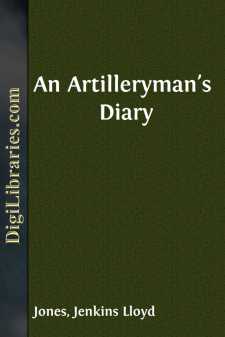Categories
- Antiques & Collectibles 13
- Architecture 36
- Art 48
- Bibles 22
- Biography & Autobiography 813
- Body, Mind & Spirit 142
- Business & Economics 28
- Children's Books 15
- Children's Fiction 12
- Computers 4
- Cooking 94
- Crafts & Hobbies 4
- Drama 346
- Education 46
- Family & Relationships 57
- Fiction 11828
- Games 19
- Gardening 17
- Health & Fitness 34
- History 1377
- House & Home 1
- Humor 147
- Juvenile Fiction 1873
- Juvenile Nonfiction 202
- Language Arts & Disciplines 88
- Law 16
- Literary Collections 686
- Literary Criticism 179
- Mathematics 13
- Medical 41
- Music 40
- Nature 179
- Non-Classifiable 1768
- Performing Arts 7
- Periodicals 1453
- Philosophy 64
- Photography 2
- Poetry 896
- Political Science 203
- Psychology 42
- Reference 154
- Religion 513
- Science 126
- Self-Help 84
- Social Science 81
- Sports & Recreation 34
- Study Aids 3
- Technology & Engineering 59
- Transportation 23
- Travel 463
- True Crime 29
An Artilleryman's Diary
Description:
Excerpt
Whatever value this publication may have, lies in the fact that it offers a typical case—a small cross section of the army that freed the slave and saved the Union.
The Editor of the Commission's publications has asked me to state briefly something about myself. I am one of the multitude of "hyphenated" Americans, born across the water but reared under the flag. I am a Cambro-American, proud of both designations, and with abundant heart, loyalty, and perhaps too much head pride in both. Introduced to this world in Llandyssul, Cardiganshire, Wales, November 14, 1843, I celebrated my first anniversary by landing at Castle Garden, in New York City. My parents were sturdy "come-outers" who, after the manner called "heresy", even among Protestants, worshipped the God of their fathers. They came from what in orthodox parlance was known as the "Smwtyn Du" the heretical "black-spot" in Wales. I am the third Jenkin Jones to preach that liberal interpretation of Christianity generally known as Unitarianism. The first Jenkin Jones preached his first heretical sermon in his mother's garden way back in 1726, ninety-three years before Channing preached his Baltimore sermon (1819), from which latter event American Unitarianism generally dates its beginning.
My father was a prosperous hatter-farmer—making hats for the local markets during the winter months, tilling his little ten-acre farm during the summer time. My parents were lured to America by the democracy here promised. In our family, freedom was a word to conjure by. Hoping for larger privileges for the growing family of children, they brought them to the New World, the world of many intellectual as well as material advantages. The long sea voyage of six weeks in a sailing vessel, interrupted by a dismantling storm which compelled the ship to return for repairs after two weeks sailing, brought them into the teeth of winter, too late in the season to reach their objective point in the West. So the journey was suspended and the first winter spent in a Welsh settlement near Steuben, New York.
May, 1845, found us in the then territory of Wisconsin. The broad, fertile, and hospitable open prairie country in southern Wisconsin was visited and shunned as a desert land, "a country so poor that it would not grow a horse-switch." And so, three "forties" of government land were entered in the heavy woods of Rock River valley, forty miles west of Milwaukee, midway between Oconomowoc and Watertown, which then were pioneer villages. The land was bought at $1.20 an acre, then were purchased a yoke of oxen and two cows; and when these were paid for, there remained one gold sovereign ($5) to start life with—father, mother, and six children.
Trees were felled for the log house which for the first six months was roofed with basswood bark, for the shingles had not only to be made, but the art of making them had to be acquired. In this log house were spent the first twelve remembered years of my life. In it four more children were born. In the log school-house, built in the middle of the road because it was built before the road was there—we had arrived before the surveyor—I learned to speak, read, and love the English language....


